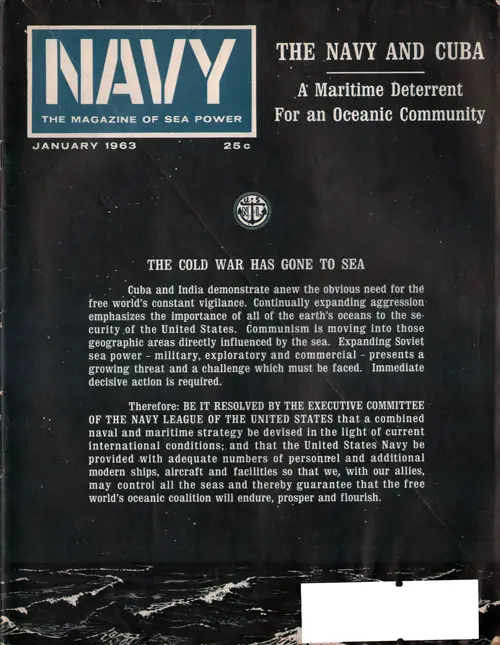Navy: The Magazine of Sea Power - January 1963

Front Cover, Navy: The Magazine of Sea Power. Vol. 6, No. 1, January 1963. GGA Image ID # 1cfcdfffa5
The Civilian Voice of the Navy - Official Publication of the Navy League of the United States. The Navy League is an independent, civilian organization. Statements contained herein have no official sanction or approval by the Navy Department.
The January 1963 issue features articles on The Navy and Cuba: Operational Report, Deterrent Strategy and the Oceanic Community, Automation at Sea, Sea Treasures in Bottles, and More.
From the Front Cover
Cuba and India demonstrate anew the obvious need for the free world’s constant vigilance. Continually expanding aggression emphasizes the importance of all of the earth’s oceans to the security of the United States. Communism is moving into those geographic areas directly influenced by the sea. Expanding Soviet sea power - military, exploratory and commercial - presents a growing threat and a challenge which must be faced. Immediate decisive action is required.
Therefore: Be It Resolved by the Executive Committee of the Navy League of the United States that a combined naval and maritime strategy be devised in the light of current international conditions; and that the United States Navy be provided with adequate numbers of personnel and additional modern ships, aircraft and facilities so that we, with our allies, may control all the seas and thereby guarantee that the free world’s oceanic coalition will endure, prosper and flourish.
Table of Contents
Features
- Editorial
- The Navy and Cuba: Operational Report
By Jack Kestner - Deterrent Strategy and the Oceanic Community
By George E. Lowe - Automation at Sea
By Captain E. B. Perry, USN (Ret.) - Symbolizing Unity of the Americas
By Ensign Claude E. Erbsen, USNR - Communist Squadron in London’s River
By Desmond Wettern - Sea Treasures in Bottles
By Raymond Schuessler - A- Bit About a Buddha
By Harold Helfer
Departments
- President ’s Message
- 61st National Convention
- Navy Day 1962
- Portrait—VADM Alfred G. Ward, USN
- Council of the Month
- Membership
- With the Marines
- Youth Program
- News of Councils
Advertisers
- American Telephone & Telegraph Co.
- Cerveceria Corona, Inc.
- Coca-Cola Bottling Company of Puerto Rico, Inc.
- McDonnell Aircraft
PRESIDENT’S MESSAGE
The front cover of this issue of “Navy—The Magazine of Sea Power” contains the text of a Resolution adopted by your Executive Committee at its last meeting—one of the most cogent resolutions we have ever put on paper.
We hope that all who see it will ponder it carefully, weigh its obvious conclusion and lend his voice toward implementing it in whatsoever way he is able.
The Cold War has gone to sea. The Cold War is now a wet war.
Lebanon and the Formosa Strait were examples, but Cuba is less than 100 miles from the Florida coast. The United States Navy’s quarantine or selective blockade of offensive weapons to Castro’s Communist controlled island should convince skeptics of the importance of control of the seas in times of strife.
The Navy League has always contended that sea power, nurtured and kept modem, is vit.il to our nation’s security. It was thus in 1902, beforr .ilr power and the atomic age. It is today, and so long as three-quarters of the earth’s surface is wet, it will be in the future. Nothing has better underscored the validity of the Navy League’s 60-plus-year-old thesis than the recent Cuban crisis. Without a shot having to be fired, our Naval strength successfully carried out our National policy.
A recent development to which we must also turn out attention is Red China's activity on the Indian border. Many military observers and global strategists believe it is obvious that the Peking regime is pointed toward the Indian Ocean . . . that great basin which today is a relative vacuum of Free World sea power without the erstwhile great Hritlsh Fleet. More American Men of War could be put to good use there.
But back to Cuba, close to home, think if you will of the alternatives which might have been available to our President had the United States no Navy, or a weak one . . . submission or nuclear war. . . sea power in its practical application permitted resolving of the Cuban crisis without result to either extreme.
We believe that an increasingly strong, versatile and mobile sea-going force will Income more and more important as the Free World faces up to its problems and responsibilities We believe that the Navy League’s primary Job in educating the American people of the importance of our maritime power is succinctly expressed by the Resolution on this issue’s cover.
ROBERT CROWN. National President Navy League of the United States
